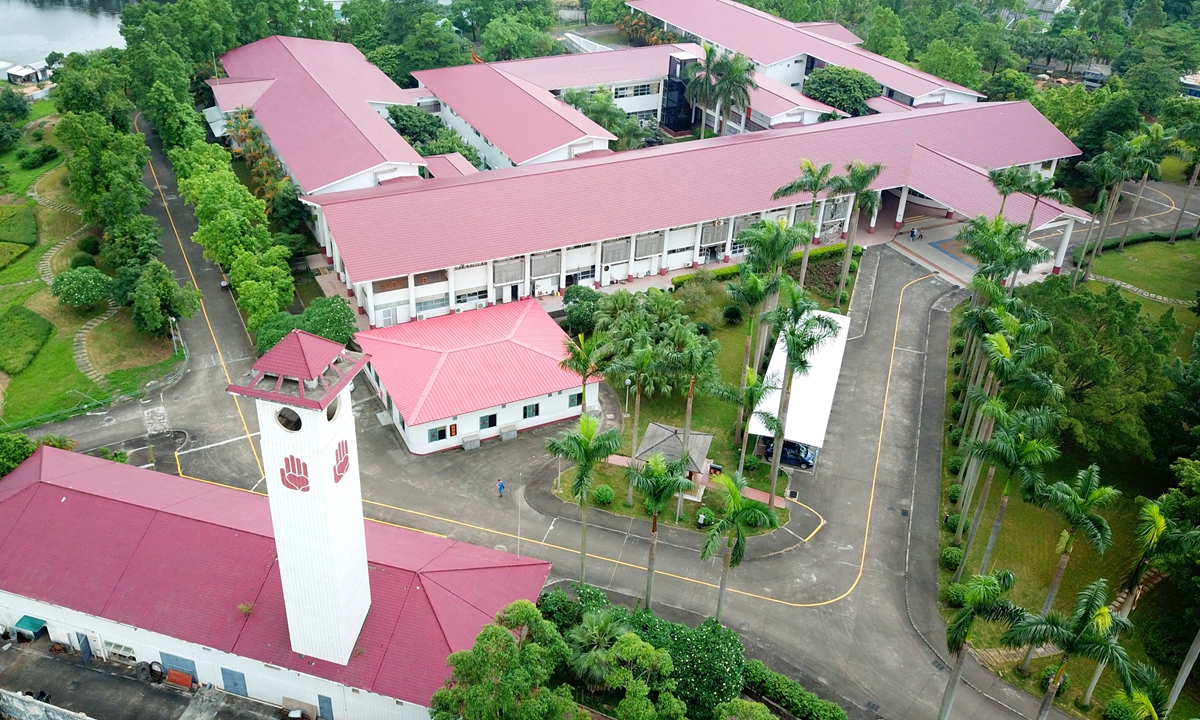Looking for affordable elderly care options
More Hong Kong retirees settle down in mainland amid integration of GBA

Chow Chi-ming enjoys his 86th birthday party at the Hong Kong Jockey Club Helping Hand Zhaoqing Home for the Elderly on June 20, 2024. Photo: Courtesy of the elderly home
Amid laughter and joy, local kids danced and sang to celebrate the 86th birthday of Hongkonger Chow Chi-ming at a nursing home in Zhaoqing, South China's Guangdong Province on Thursday.
The room echoed with well wishes and blessings for a long and healthy life ahead.
It has been about half a year since Chow embarked on a new chapter of his life in the Chinese mainland. Despite being away from Hong Kong, the love and care shown by those around him have made him feel right at home.
Last November, Chow, whose ancestral home is Guangdong, returned to his hometown to settle down in a nursing home.
Chow is among more than 90,000 senior Hongkongers aged 65 or above who chose to live in Guangdong on a permanent basis after retirement, according to statistics cited by media in 2023.
The Hong Kong Jockey Club Helping Hand Zhaoqing Home for the Elderly is one of the four pioneers being selected to participate in the "Residential Care Services Scheme in Guangdong (GDRCS Scheme)" initiated by the Social Welfare Department of Hong Kong Special Administrative Region (HKSAR), the Global Times learnt.
Hong Kong is facing a rapidly aging population. It is estimated that over 20 percent of its residents are aged 65 and above. Hong Kong's population was approximately 7.54 million in mid-2023, according to data published by the HKSAR government.
In this context, the GDRCS Scheme is to provide an option for eligible elderly people who are waiting for subsidized care. They can choose to live in the residential care homes for the elderly in Guangdong designated under the scheme, according to the Social Welfare Department.
New trend
For the past 40 years, Chow had been shuttling between Hong Kong and Guangdong, visiting many cities in the province. As he aged, Chow's health began to decline. High blood pressure, high blood sugar, and high cholesterol levels were all contributing factors. Also, his mobility was getting worse. Traveling between Hong Kong and the mainland became difficult, and living independently became a challenge.
Moving into a nursing home became a practical option.
Initially hesitant after visiting a few nursing homes in Hong Kong, Chow was introduced to a nursing home in Zhaoqing. He saw this as an opportunity to return to the mainland and settle down.
After a few days of trial stay, the spacious facilities, tranquil environment and attentive care convinced Chow to make this nursing home his permanent residence, the Global Times learnt.
In the nursing home, there are 41 senior Hongkongers like Chow who have returned to the mainland for affordable care, accounting for about 40 percent of the residents living in the Zhaoqing institution. And the number is expected to continue to increase.

Aerial view of the elderly home Photo: Courtesy of the elderly home
Affordable care
Due to limited elderly care resources in Hong Kong, as well as the accelerated integration of the Guangdong-Hong Kong-Macao Greater Bay Area (GBA), more and more senior Hong Kong residents are turning to mainland elderly care as an alternative.
According to research led by Shi Cheng, a research assistant professor from School of Graduate Studies (GS) & Institute of Policy Studies (IPS) with Lingnan University, Hong Kong residents will usually have to wait for two years to obtain subsidized elderly care beds provided by the Hong Kong SAR government, for some facilities with better hardware there is a waiting time of up to six years.
Some elderly people have even passed away while waiting in line, Shi told the Global Times
According to statistics released by the HKSAR in 2023, about 89,100 people aged 65 or above were already living in Guangdong. Some select their own care facilities, while others opt for the GDRCS Scheme to receive care in the mainland.
Shi told the Global Times that most people who seek to spend their golden years in the mainland are usually those born in the mainland cities or are familiar with the mainland environment. Her survey showed that most would prefer to rent or purchase housing in the mainland, rather than stay in a nursing home.
Factors such as larger living space, cheaper property prices, lower cost of living, more convenient transportation, better living environment, convenient life and similar cultural background are the main reasons for Hong Kong elderly people wanting to go to a mainland city in the Greater Bay Area for retirement.
Hundreds of trains depart from and arrive at the West Kowloon Station in Hong Kong every day, connecting directly to cities in the Greater Bay Area in mainland, making it much easier for elderly people with mobility issues to travel.
For example, by taking a high-speed train for approximately 1 hour and 40 minutes from Hong Kong, followed by a 40-minute bus ride, elderly residents of Hong Kong can easily reach the Zhaoqing nursing home. This convenience has made it more appealing for retirees to consider moving to the mainland for their golden years.
Obstacles still exist
However, problems have surfaced because of different operational mechanisms between Hong Kong and mainland cities.
As medical records from Hong Kong are not directly shared with medical institutes in the mainland, Shi said that Hong Kong senior residents need to travel between the two places as they have to frequently present documents in person.
Also, the elderly from Hong Kong cannot enjoy some of the social welfare benefits in Hong Kong when they retire in the mainland. At the same time, many elderlies in Hong Kong are not eligible for mainland welfare, according to Shi.
When they enter a state of semi-disability or disability, returning to Hong Kong for medical treatment becomes particularly difficult, and some of the elderly have to return to live in Hong Kong later on, Shi said.
To facilitate cross-border elderly care, the Greater Bay Area has released multiple policies.
The Outline Development Plan for the Guangdong-Hong Kong-Macao Greater Bay Area in 2019 stated that it supports investors from Hong Kong and Macao to establish elderly and other social service institutions in the nine cities of the Pearl River Delta in accordance with regulations.
In June 2023, Guangdong and Hong Kong also jointly signed a "Memorandum of Understanding on Promoting Elderly Care Cooperation between Guangdong and Hong Kong".
The Social Welfare Department announced on May 2 that two additional residential care homes for the elderly, located in Foshan and Shenzhen, will newly become recognized service providers under the GDRCS Scheme starting from May 6, bringing the total number of such nursing homes for Hongkongers in the mainland to four.



